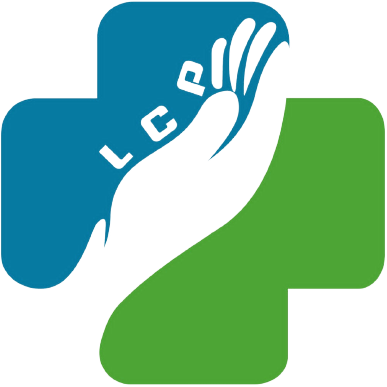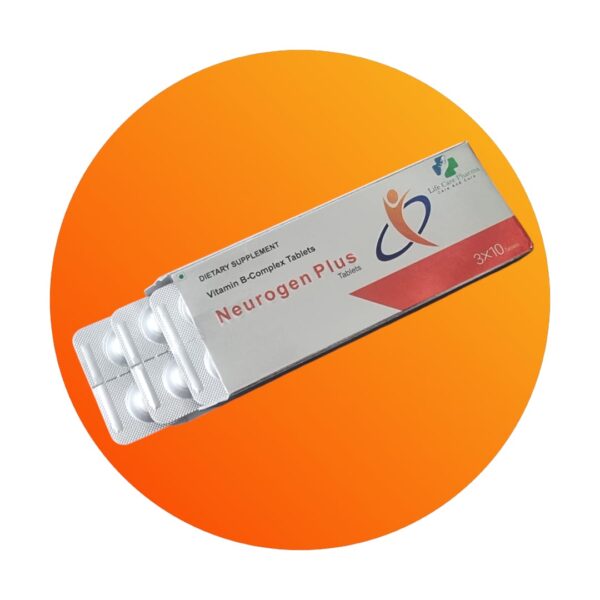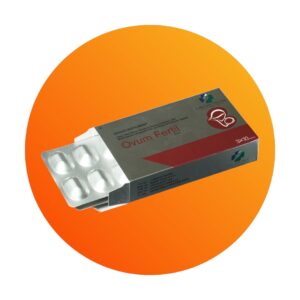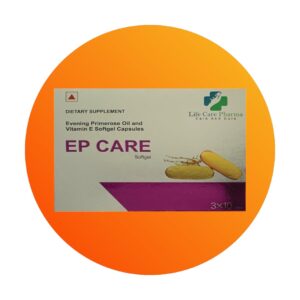Description
Life Care Pharma introduces
Neurogen Plus Tablet
Vitamin B-Complex (B1,B2,B3,B5,B6,B9,B12)
Neurogen Plus contains the full complement of vitamin-B Which Latest and first time in Bangladesh
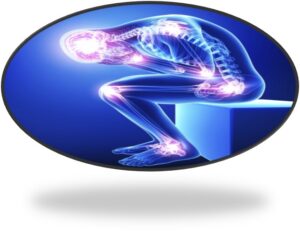
Neurogen Plus is use in the treatment of long-lasting (chronic) pain caused by nerve damage due to diabetes, shingles or spinal cord injury.
Neurogen Plus is a combination of B vitamins used to treat or prevent vitamin deficiency due to poor diet, certain illnesses, alcoholism, or during pregnancy.
Neurogen Plus For
- Low Back Pain
- Proper nerve function
- Cervical Syndrome
- Neuralgia
- Growth of red blood cells
- Trigeminal Neuralgia
- Sciatica
- Improved Brain Function.
Vitamin B1 (Thiamin):
Vitamin B1 or thiamin is essential for glucose metabolism and nerve, muscle, and heart function. People may need supplements if their diet does not provide enough B vitamins, during hemodialysis, and for other reasons.
Vitamin B1 or Thiamin helps your body convert food into energy. Your brain depends on vitamin B1 to metabolize glucose and your nerves need it to function properly. Women need 1.1 milligrams and men should get 1.2 milligrams of Vitamin B1 daily.
Vitamin B2 (Riboflavin):
Riboflavin is involved in many body processes. It’s required for the proper development of the skin, lining of the digestive tract, blood cells, and brain function.
Riboflavin assists many enzymes with various daily functions throughout the body, a deficiency can lead to health problems. Animal studies show that the brain and heart disorders and some cancers can develop from long-term riboflavin deficiency.
Vitamin B3 (Niacin):
Niacin is a type of B vitamin that offers benefits for you whole body, from your brain to your skin. Niacin may help lower cholesterol, ease arthritis, and boost brain function, among other benefits.
Niacin works in the body as a coenzyme, with more than 400 enzymes dependent on it for various reactions. Niacin helps to convert nutrients into energy, create cholesterol and fats, create and repair DNA, and exert antioxidant effects.
Vitamin B5 (Pantothenic acid):
Pantothenic acid is known as vitamin B5.Pantothenic acid helps the body utilize carbohydrates, proteins, and lipids. It is also important for maintaining healthy skin.
It supports blood cell production and the conversion of food you eat into energy. Deficiency may lead to fatigue, headaches, and numbness in the hands and feet.
Vitamin B6 (Pyridoxine):
Vitamin B-6 (pyridoxine) is important for normal brain development and for keeping the nervous system and immune system healthy.
Pyridoxal 5’ phosphate (PLP) is the active coenzyme form and most common measure of B6 blood levels in the body. PLP is a coenzyme that assists more than 100 enzymes to perform various functions, including the breakdown of proteins, carbohydrates, and fats; maintaining normal levels of homocysteine (since high levels can cause heart problems); and supporting immune function and brain health.
Vitamin B9 (Folic acid):
Folate (folic acid) is necessary for the production of red blood cells and for the synthesis of DNA (which controls heredity and is used to guide the cell in its daily activities). Folic acid also helps with tissue growth and cell function. In addition, it helps to increase appetite when needed and stimulates the formation of digestive acids.
Folate is also needed to produce healthy red blood cells and is critical during periods of rapid growth, such as during pregnancy and fetal development.
Vitamin B12 (Cobalamin):
Vitamin B12 does a lot of things for your body. It helps make your DNA and your red blood cells. Vitamin B12 is required for the function and development of many parts of the body, including the brain, nerves, and blood cells. Vitamin B-12 deficiency is not common in the U.S. However, people who follow a vegetarian or vegan diet might be prone to deficiency because plant foods don’t contain vitamin B-12. Older adults and people with digestive tract conditions that affect absorption of nutrients also are susceptible to vitamin B-12 deficiency.
Dosage Guideline: 1Tablet twice a day after meal for 3 to 6 months
Ref:
- Bettendorff L. Thiamin. In: Erdman JW, Macdonald IA, Zeisel SH, eds. Present Knowledge in Nutrition. 10th ed. Washington, DC: Wiley-Blackwell; 2012:261-79.
- https://www.healthline.com/health/food-nutrition/vitamin-b-complex#benefits
- Updated by: John D. Jacobson, MD, Professor Emeritus, Department of Obstetrics and Gynecology, Loma Linda University School of Medicine, Loma Linda, CA. Also reviewed by David C. Dugdale, MD, Medical Director, Brenda Conaway, Editorial Director, and the A.D.A.M. Editorial team1978;1:576-81.
